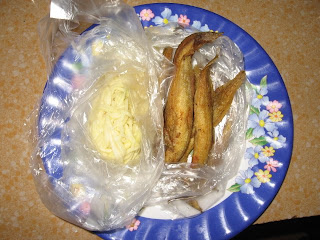My husband grew up mainly eating rice and prahok, that’s all they could afford. I think many Cambodians are in a similar situation, and they must be having a really hard time at the moment.
Since September prices have been going up faster than usual. In October when we first noticed, it was quite scary.
According to the March SE Globe:
“Consumer price inflation spiked to more than 10% at the end of 2007, over double its average level in the preceding five years.”
“Food prices are under special pressure, with staples such as rice, fish, pork, beef, vegetables and fruit up by over 30% last year, and with the biggest rises in the last few months.”
“Rising fuel prices are adding further pressure, felt both directly and as add-ons to transport and production cost. There is evidence that the trend will continue in 2008.”
South Eastern Globe, March 2008, Philipp Coggan
www.se-globe.comJust in the last few weeks we’ve been noticing inflation everywhere. Prahok more than doubled it’s price in the last 12 month, I read in the Cambodia Daily on March 18.
Over the next few days I heard people talking about how rice was about to get heaps more expensive. It’s already been increasing in price over the last six months, how will people afford it if it increases more? I was listening to Radio Australia one night and there was a program about the rice shortage in the world at the moment. Lots of countries have stopped exporting rice including India and Australia. The next day (March 26) I read Cambodia had just stopped exporting rice too.
Within days of this happening a bottle of cooking gas went from $20 USD to $40. In October we stopped using our electric kettle and rice cooker. To save money we started doing everything on our two gas hot plates. But now gas has gone up too!
It seemed logical to me that I should give my language helpers a pay rise. When I was explaining this to one of them she thought it was a really strange idea.
“Why? I’ve never heard of this before?” Even though the cost of everything is going up people are still earning the same amount. In some cases earning less- people have less money to spend so are buying less. For example my mother in law sells ready made breakfast food. She gets up around 5am each morning to finish cooking and start selling. Her costs are rising but her customers declining.
For us it may mean that we cut back on some things- like beef and dairy products for example*. But what does it mean for people who couldn’t afford those types of foods to begin with?
This is meant to be just a snap shot of our life, not an economic analysis. There a various reasons why this is all happening. It’s connected to agricultural/environment issues both here and internationally, as well as other things that are happening in the economy and politics. I didn’t mention land prices; these have also been going up faster and faster. If you want to know more you could start with these links : Food inflation, Rice price hike, , some more comments on this and what the BBC has to say about rice in Asia these days.
*Beef and dairy
When I first got to Cambodia 1 litre of UHT milk cost 90cents. Currently the closest shop to us is selling it for 1.55-1.70.
A year ago a kg of beef cost $4. In October it went up to $4.50. Last month it went up to $5.




